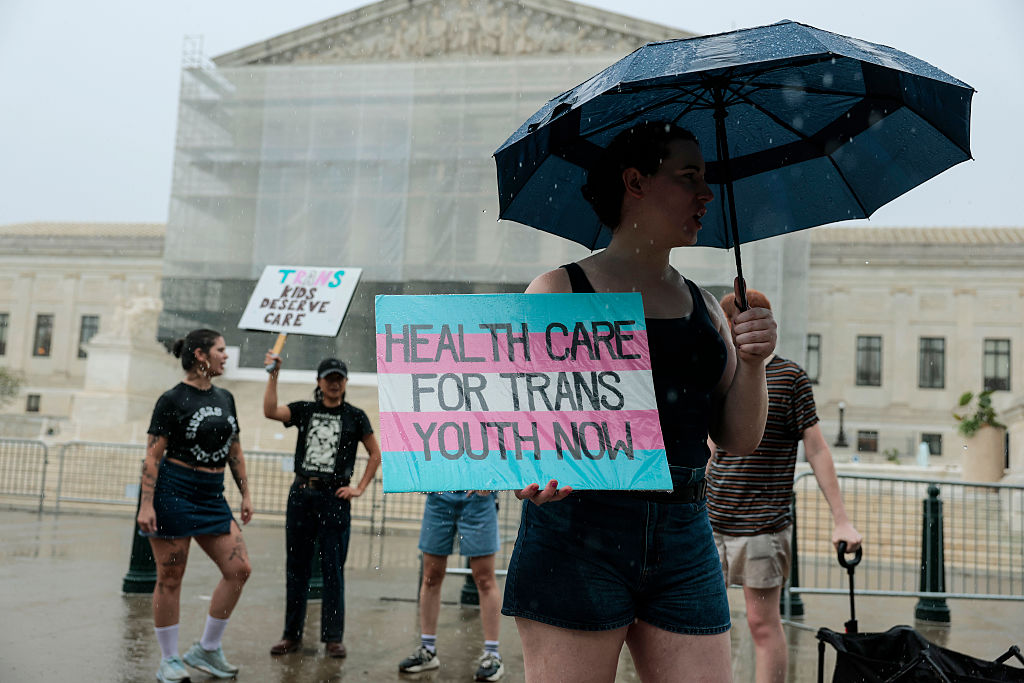Back in December 2024, a group of trans youth and supporters gathered outside the U.S. Supreme Court. Inside, lawyers presented oral arguments in U.S. v. Skrmetti, a case challenging a Tennessee law that bans doctors from performing gender-affirming care—providing hormones, surgery and puberty blockers—for young people.
Standing outside the court, I learned the stakes of the case from Ari, a trans college student from Tennessee. “I think legislation like this only leads to more dead kids,” Ari told me then. “Tennessee, being one of the most poorly educated, most under-resourced states in the country, is ignoring its own problems in order to terrorize children and families who just want to support their kids.” But as arguments progressed inside the court, justices like John Roberts repeatedly asserted that the science was too complicated for them to wrap their heads around, and that this trans stuff should therefore be left up to the states.
Six months later, on June 18, the Court issued a ruling that confirmed what many trans people in the country feared would happen: The justices voted along party lines, and the Court’s conservative majority upheld Tennessee’s law. “This case carries a simple lesson: In politically contentious debates over matters shrouded in scientific uncertainty, courts should not assume that self-described experts are correct,” wrote Clarence Thomas in a concurring opinion in the case. Instead of leaving medical decisions to children and their families, it leaves them in the hands of state governments. They concluded that the Tennessee law did not discriminate on the basis of sex, and therefore should not be subject to heightened scrutiny from the Supreme Court.
@xtramagazine In the case of the U.S. v. Skrmetti, the United States Supreme Court ruled to uphold a Tennessee law that restricts doctors from providing medical care like puberty blockers and hormones to trans youth —functionally a ban on gender-affirming medical care for minors. In the 6-3 ruling, the court ruled that a law like this that permits treatment for cis kids but not trans kids is not discriminatory. Chief Justice John Roberts delivered the ruling, arguing that the law “exclude any individual from medical treatments on the basis of transgender status” but rather removes diagnoses like gender dysphoria from the range of treatable conditions. All three liberal justices dissented, with Justice Sonia Sotomayor arguing that the law specifically discriminates against trans youth. In the official dissent, she wrote: “By retreating from meaningful judicial review exactly where it matters most, the Court abandons transgender children and their families to political whims.” We break down how this law and ruling could have a resounding impact on health care access and human rights across America 🇺🇸🧑⚖️ #lgbtqnews #surpremecourt #skrmetti #trans #uspolitics #transrights #transyouth #usvskrmetti ♬ original sound – Xtra Magazine
“By retreating from meaningful judicial review exactly where it matters most, the Court abandons transgender children and their families to political whims,” Justice Sonia Sotomayor wrote in a dissenting opinion.
“We here in Tennessee knew what this was going to mean in the grand scheme of things,” said Bean Chapman of the Tennessee Equality Project. “I went straight to thinking about all of the families here in Tennessee that already have gender-affirming care bans, and what kind of day they were going to have. Even though they know it hurts kids, [the Supreme Court] still makes these decisions anyway.”
The day after the ruling, another group of trans people lined up outside the Supreme Court, and in what activist Raquel Willis describes as “sort of a sacred ceremony,” they stood by the police barricades in front of the court and injected their hormones, or took them in pill form. They released billowing pink and blue smoke overhead, which Willis says was bought from the same suppliers who work with gender-reveal parties.
“For us, it was important to show up in radical defiance of the ruling, and demystify some of the misinformation out there about gender-affirming care, what it looks like and what it means to our people,” Willis tells Xtra. Alongside eight other activists from the advocacy group Gender Liberation Movement, she was arrested for blocking a road in front of the court while holding banners in the colours of the trans flag.
“Conservatives have really dominated with a horrific misinformation and disinformation campaign for the last decade or so, in regards to trans experiences,” Willis says. It’s a campaign that was effective, at least in part, because of how willing liberal institutions were to amplify it. Publications like the Atlantic and the New York Times began publishing “just-asking-questions”-style stories in the late 2010s. In 2016, North Carolina introduced a “bathroom bill.” That didn’t work, largely thanks to a well-mounted opposition campaign, but a version in Florida did pass a few years later.
In 2020, right-wingers began going after trans people’s participation in sports, saying they just weren’t sure whether trans people could compete fairly alongside cis athletes. Transphobic commentator-influencers like LibsofTikTok’s Chaya Raichik gained prominence online. Pressure groups like Moms for Liberty pushed book bans and trans sports bans. Groups like the Heritage Foundation created templates for anti-trans bills, which were then introduced nationwide. In 2024, legislators introduced 701 different anti-trans bills at the state level. Nine hundred and forty have been introduced so far in 2025.
That manufactured uncertainty has made its way to the highest court in the land, which cited multiple New York Times stories in the Skrmetti decision. The case centres on false assertions that gender-affirming care for minors is, as Justice Roberts put it, an “unresolved issue.” Based on that inaccurate idea—the science on this issue is, in fact, settled—the Court’s majority concluded that banning medical care for trans minors as a class does not violate the equal protection clause of the U.S. Constitution.
Twenty-seven U.S. states have enacted bans or restrictions on gender-affirming care for minors. This ruling will provide reinforcement to those state-level laws, meaning these bans are more likely to survive future legal challenges. And efforts to curtail the rights of trans people, both children and adults, are ongoing at the federal level. Those attempts to box trans people out of public life include a provision in President Donald Trump’s “Big Beautiful Bill” budget package that would prohibit Medicaid—the insurance used by over 70 million people in the country, including many low-income families and minimum-wage workers—from covering gender-affirming care of any kind. (Back in the 1980s, President Ronald Reagan executed a similar manoeuvre.)
“It’s definitely a signal toward what many of us have known: that Conservatives want to block access to gender-affirming care for everyone, regardless of age, not just youth,” Willis says. “And what we’re hearing now with the Supreme Court ruling is that the majority of these justices are saying a ban like the one in Tennessee is okay. That [it] is okay to specifically block access to many of the same treatments for trans youth that cisgender youth are able to access.”
In the state of Missouri, a ban on trans youth healthcare—one that was also at stake in Skrmetti—has been in effect since the summer of 2023. Since then, some trans youth and their families have fled the state permanently. Others, who still live in Missouri, drive several hours to Kansas or Illinois several times per month to get their care. Missouri’s attorney general has railed against gender-affirming care as “experimental” and called it “gender mutilation.” When doctors come to the Missouri legislature to testify against restrictions on medical care for trans people, they’re sometimes greeted with politicians saying they “won’t listen to doctors who disagree with God.”
“Skrmetti, in Missouri, reaffirms to politicians that they have the ability to overrule an individual family’s right to choose the healthcare that they need,” said Robert Fischer, communications director for the Missouri LGBTQ2S+ advocacy organization PROMO. “If I were to apply this logic to other forms of healthcare, let’s say chemotherapy—it would be unthinkable, you know, to think that a state legislative body or a federal government could say you’re no longer allowed to access this healthcare because of a political whim.”
Back in D.C., Willis and her fellow activists were released after a few hours in jail. “We have to move away from this idea that gender-affirming care should be separated from other forms of healthcare,” Willis tells Xtra hours after her arrest. “It is connected to the fight for Reproductive Justice and access to abortion and access to fertility treatments and so much more, and the attacks on gender-affirming care and abortion access are tied to the attacks on Medicaid and Medicare. We need a mass movement that is invested in fighting for healthcare for all, bodily autonomy for all.”


 Why you can trust Xtra
Why you can trust Xtra


